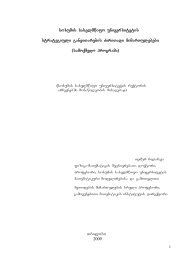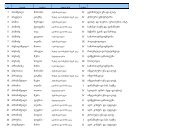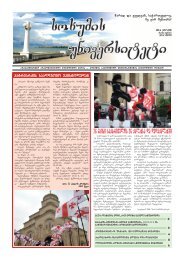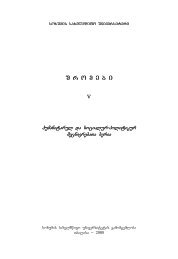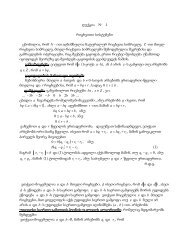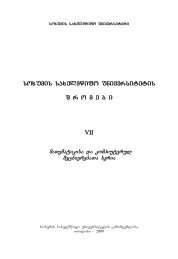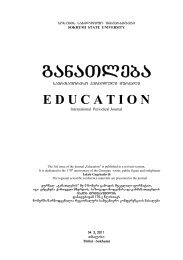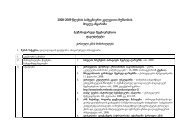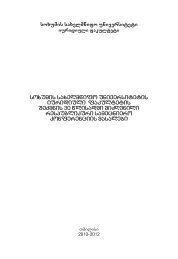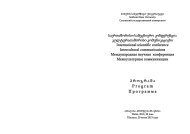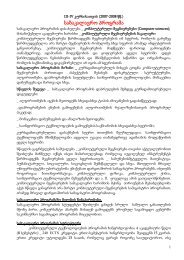- Page 2 and 3:
soxumis saxelmwifo universitetisoxu
- Page 4 and 5:
SOKHUMI STATE UNIVERSITYPROCEEDINGS
- Page 6 and 7:
S i n a a r s ie n a T m e c n i e
- Page 8 and 9:
vaxtang jafariZe. sebastopolisis (d
- Page 10 and 11:
C O N T E N T SL i n g u i s t i c
- Page 12 and 13:
Kakhi Kopaliani. Suicidal Motives f
- Page 14:
soxumis saxelmwifo universitetis Sr
- Page 17 and 18:
dis, amaos~ mniSvnelobiT 1 da miuTi
- Page 19 and 20:
es fuZe meordeba indoevropul enebSi
- Page 21 and 22:
xelwodebiT Seuwiravs `abanoisa saxl
- Page 23 and 24:
soxumis saxelmwifo universitetis Sr
- Page 25 and 26:
specialur lingvistur literaturaSi s
- Page 27 and 28:
8. dudiS ardeba - быть дерз
- Page 29 and 30:
`tiriliT Tvalebi Semeweba~.[sityvas
- Page 31 and 32:
MARINE KAKACHIA, KETEVAN MARGIANI,M
- Page 33 and 34:
dalis xeobisa da, zogadad, dasavleT
- Page 35 and 36:
zogadad, saqarTvelos hidronimebze,
- Page 37 and 38:
kldis ferdobisa, sadac Sxefebad mod
- Page 39 and 40:
i: dðl `nadirobis qalRmerTi, monad
- Page 41 and 42:
KETEVAN MARGIANIHISTORICAL AND MODE
- Page 43 and 44: saxleobis enobriv identobas (da sae
- Page 45 and 46: vi RonisZieba aqvs gatarebuli. dana
- Page 47 and 48: exmaura kanonis miRebas da es aRiqv
- Page 49 and 50: koss, manamde afxazTa `didi megobra
- Page 51 and 52: MERAB NACHKEBIATHE POPULATION NUMBE
- Page 53 and 54: alizi), aqcentirebulia intenciis te
- Page 55 and 56: avSirdeba sxva faqtorebi. arsebiTad
- Page 57 and 58: Tad, Zveli romis civilizacias da mi
- Page 59 and 60: - ho! da amaRam iq viqnebiT, xval k
- Page 61 and 62: 60soxumis saxelmwifo universitetis
- Page 63 and 64: 62savlurqarTuli variantebic: arsia
- Page 65 and 66: 64danarTiafxaz muhajirTa Soris gavr
- Page 67 and 68: aRir-ifagabal-ifagabra-ifagabri-ifa
- Page 69 and 70: soxumis saxelmwifo universitetis Sr
- Page 71 and 72: Sinaarsis aRqmaSi. molaparakis mier
- Page 73 and 74: sityvebiT rom vTqvaT, ,,ilokuciurad
- Page 75 and 76: 74soxumis saxelmwifo universitetis
- Page 77 and 78: viT, situaciis participantebs - age
- Page 79 and 80: ogorc marjvena distribuciis ganusaz
- Page 81 and 82: masalis obieqtur gadmocemas, miuker
- Page 83 and 84: unar-Cvevebis ganviTareba-srulyofa
- Page 85 and 86: moadgens zefrazul erTobliobas), Tan
- Page 87 and 88: TAMAR JOJUAFOR THE PERFECTION OF TH
- Page 89 and 90: Aufbau des Artikels folgte der Dars
- Page 91 and 92: 901. Das Stammmorphem siebent- bild
- Page 93: ung der Dialekte verbindet.Zu Begin
- Page 97 and 98: gkeit der schöngeistigen Literatur
- Page 99 and 100: modgenilia uaxles periodSi, kerZod
- Page 101 and 102: saTauriT da romelsac - ra Tqma unda
- Page 103 and 104: Tanac gamoyofen mas rogorc savsebiT
- Page 105 and 106: TEA JGARKAVANARRATIVE EXPOSITION AC
- Page 107 and 108: Известно, что из сл
- Page 109 and 110: жилось так, что име
- Page 111 and 112: дняшний день являе
- Page 113 and 114: Интересно заметить
- Page 115 and 116: национального мент
- Page 117 and 118: DIANA ALANIATHE RUSSIAN LANGUAGE OF
- Page 119 and 120: зываемое также тео
- Page 121 and 122: культуры разрабаты
- Page 123 and 124: предложено в работ
- Page 125 and 126: NINO ETERIATEACHING RUSSIAN AS A FO
- Page 127 and 128: literaturaTmcodneobaSi am sakiTxTa
- Page 129 and 130: Cvens droSi beTlemis irgvliv ramden
- Page 131 and 132: uxedavad amgvari cdebisa, mainc Zne
- Page 133 and 134: NANA ARAKHAMIAARTIST’S INTENTION
- Page 135 and 136: giorgi wereTelTan erTad, monawileob
- Page 137 and 138: a, romelmac yrilobis darbazi moicva
- Page 139 and 140: ilia, Cveni akaki~, `kapitani buxai
- Page 141 and 142: laven, mtris winaSe dadgeba berikac
- Page 143 and 144: Zaxili mesxTa~. 1es sityvebi aRmoxd
- Page 145 and 146:
va nawilisa da bolosityvisagan. und
- Page 147 and 148:
soxumis saxelmwifo universitetis Sr
- Page 149 and 150:
afiuli romanis ganviTarebisaTvis ga
- Page 151 and 152:
sadac simarTle swored iseTia, rogor
- Page 153 and 154:
cios, maradiuli faseuloba ar daukar
- Page 155 and 156:
da Tu politikur cxovrebaSi bolSeviz
- Page 157 and 158:
tavs mwerali eris ganviTarebis dial
- Page 159 and 160:
wyoba da damokidebuleba metad sagul
- Page 161 and 162:
soxumis saxelmwifo universitetis Sr
- Page 163 and 164:
momxdars - saqarTvelos maradiul sat
- Page 165 and 166:
ixilvebis oTxebad Tamar, misworebul
- Page 167 and 168:
ZlierebiT SemkrTalni, sakuTar Zlier
- Page 169 and 170:
maelianoba sulSi SemorCenodaT~... 1
- Page 171 and 172:
Zalauflebas edeba samani. es ar ari
- Page 173 and 174:
veli Taobis ebraelma ise unda icxov
- Page 175 and 176:
NANA KUTSIATHE NOVEL “TIME FOR SI
- Page 177 and 178:
gudiaSvils gr. robaqiZis portreti d
- Page 179 and 180:
nikolaus zombarTi. 1gr. robaqiZe Ta
- Page 181 and 182:
vandel saxes da igi ukve dionisiuri
- Page 183 and 184:
cnobilia, rom piTagorelebma Seqmnes
- Page 185 and 186:
omanSi gamoyenebulia mravali bibliu
- Page 187 and 188:
Tan) dakavSirebuli saxeebia, magram
- Page 189 and 190:
aldis (dionises) cxovrebis Tanamgza
- Page 191 and 192:
darbaisle (romelic edaveba yvela ra
- Page 193 and 194:
simboluri mxarec. arCibald mekeSis
- Page 195 and 196:
mokravs Tvals mobanave matasis, mag
- Page 197 and 198:
dayofa, dasusteba, cotne dadiani, b
- Page 199 and 200:
Teli azrovnebiT, srulfasovani didna
- Page 201 and 202:
cotne dadianis cxenis Tqaruni da uR
- Page 203 and 204:
`modis saqarTvelo e magis jiSisa,ro
- Page 205 and 206:
ufro gaaRviZos mamulis siyvarulis g
- Page 207 and 208:
`Zlivs gamovdivar warsulidanda mogo
- Page 209 and 210:
ul xarisxs, sayovelTao keTildReobis
- Page 211 and 212:
sebr sakuTari leqsis bwkarebSi, uaR
- Page 213 and 214:
SoTa niSnianiZis leqsi `roca me gar
- Page 215 and 216:
gadmosuli xari did emociur datvirTv
- Page 217 and 218:
lebi da niSanTvisebani gadaaqvs mas
- Page 219 and 220:
waiyvanes Tamar-qali afxazeTSi diel
- Page 221 and 222:
uli leqsebis garda, TviTnabadi, mox
- Page 223 and 224:
lisunarianobiT avseben mis lirikul
- Page 225 and 226:
lac, aRniSnul periodSi partiis kont
- Page 227 and 228:
om literaturaSi simarTlis gadmocema
- Page 229 and 230:
lic Cveni mwerlobis ZiriTad mxatvru
- Page 231 and 232:
sakavSiro Jurnalma uari ganacxada (
- Page 233 and 234:
“cTomilnis” bedi. o. CxeiZem sa
- Page 235 and 236:
damokidebuleba araerTgvarovani iyo,
- Page 237 and 238:
tebs saxelmwifo politikis gatarebas
- Page 239 and 240:
TanaSemwe, poskrebiSevi gadascems m
- Page 241 and 242:
moebebSi warmoCenilia simarTlis zei
- Page 243 and 244:
turi Taobis aRzrdis perspeqtivas.fa
- Page 245 and 246:
soxumis saxelmwifo universitetis Sr
- Page 247 and 248:
leqtualur romans axasiaTebs~; 1 l.
- Page 249 and 250:
uxedavad imisa, rom romanSi moTxrob
- Page 251 and 252:
k. imedaSvili marTebulad aRniSnavs,
- Page 253 and 254:
Si ar unda Caerios... mgonia, arc e
- Page 255 and 256:
orivesTvis mTavaria rwmena sakuTari
- Page 257 and 258:
moyvasisadmi da amitomac cdilobs mi
- Page 259 and 260:
muSnis azriT, `TviT qristesganac ki
- Page 261 and 262:
Ta TuTaSxiasa da borotebis maradiul
- Page 263 and 264:
filosofiuri, politikuri, samarTlebr
- Page 265 and 266:
so nawarmoebTa rigSi ayenebs. 1LELA
- Page 267 and 268:
Sulgis mefis, aramed qalRmerT iSTar
- Page 269 and 270:
yvelo mwerlobas bibliidan aqvs gaTa
- Page 271 and 272:
iyo poemaSi. amaze metyvelebs mis m
- Page 273 and 274:
lia swori saxelwodeba erT-erTi etli
- Page 275 and 276:
tarielma gakicxa misi laCruli qceva
- Page 277 and 278:
cxeni sadaviTa hyva lomsa da viTa g
- Page 279 and 280:
usTavelis poetikaSi astralur safuZe
- Page 281 and 282:
Tumca, naTlisgan gansxvavebiT, `Sav
- Page 283 and 284:
enebs, amitomac, gulaxdilad ambobs:
- Page 285 and 286:
iT, mzes upirispirdeba Rame imiT, r
- Page 287 and 288:
strofi, sadac fizikuri mze CaTvlili
- Page 289 and 290:
dRis sityvebSi, `TviT misgan dabade
- Page 291 and 292:
mkvlevrebi dRis upiratesobis maniSn
- Page 293 and 294:
soxumis saxelmwifo universitetis Sr
- Page 295 and 296:
qarTveli poetis “jadosnur naTelxi
- Page 297 and 298:
sulic saqarTvelos kuzad daxrila”
- Page 299 and 300:
vevedrebi” (`balaganis mefe~). 1
- Page 301 and 302:
aZalebda da morgisken ubiZgebda:
- Page 303 and 304:
lia: “dgas lanqerebis korianteli,
- Page 305 and 306:
feris”, “qveyana bneli demonebi
- Page 307 and 308:
iT monaTluls, eimedeboda, rom usama
- Page 309 and 310:
LUARA SORDIATHE ANTICIPATION OF THE
- Page 311 and 312:
tencialurma problemebma. rogorc m.
- Page 313 and 314:
gvaswavlis, rom ar unda gaCumde, ro
- Page 315 and 316:
lini~ daawerina. 1SesaZloa, grigol
- Page 317 and 318:
xedviT xelovanis diqtaturis samsaxu
- Page 319 and 320:
vis CaqrobaSi mdgomareobs. xelovani
- Page 321 and 322:
Во второй половине
- Page 323 and 324:
гда с его творчеств
- Page 325 and 326:
робно рассказывает
- Page 327 and 328:
национального хара
- Page 329 and 330:
soxumis saxelmwifo universitetis Sr
- Page 331 and 332:
uaryofiTi STabeWdilebebiT dabrunda.
- Page 333 and 334:
fasanaurelebi miesalmnen stumrebs d
- Page 335 and 336:
stumrebze waruSleli STabeWdileba da
- Page 337 and 338:
webs, romlebsac didi nayofi ar moaq
- Page 339 and 340:
imasTan dakavSirebiT, rom saqarTvel
- Page 341 and 342:
gziT ganviTarebas.sagulisxmoa isic,
- Page 343 and 344:
mniSvnelovani iyo adgilobrivi mosax
- Page 345 and 346:
wevrs daiTxovdnen samuSaodan, sazog
- Page 347 and 348:
,,CaTrevas Cayola sjobian”; warmo
- Page 349 and 350:
ganizatorebisaTvis misi gameoreba m
- Page 351 and 352:
moqmedebis saministrom sacdeli safr
- Page 353 and 354:
IRAKLI GELENAVACHARITY IN ABKHAZIA
- Page 355 and 356:
periodSic) Canawerebi dagvitoves di
- Page 357 and 358:
gansakuTrebiT osmalos saqarTvelosTv
- Page 359 and 360:
xSirad mosaxleoba cdilobda samarTal
- Page 361 and 362:
axloebiT yrilobis mniSvnelobiT ixma
- Page 363 and 364:
dnen patiosnobiTa da darbaislobis g
- Page 365 and 366:
soxumis saxelmwifo universitetis Sr
- Page 367 and 368:
sad, subieqturic iyo. Zalzed saeWvo
- Page 369 and 370:
samegrelos mTavarma 1839w. ianvris
- Page 371 and 372:
30 maiss gamogzavnili werili #1594,
- Page 373 and 374:
mosaxleobasTan, romlis absoluturi u
- Page 375 and 376:
foTa, radgan es kategoriulad winaaR
- Page 377 and 378:
Cans, rusebs dasWirdaT `ukana TariR
- Page 379 and 380:
eTmoboda samurzayano. magram, realo
- Page 381 and 382:
garkveva `titularul sovetniks~ ferd
- Page 383 and 384:
iyo, radgan am mxareze saboqaulos d
- Page 385 and 386:
eSi mainc ar wydeboda qurdobebi, ty
- Page 387 and 388:
KAKHA KVASHILAVAON THE PROBLEM OF E
- Page 389 and 390:
genocidi moxda da dRemde es danaSau
- Page 391 and 392:
maSeneblis mmarTvelobis periodSi (1
- Page 393 and 394:
liT meore, Cemi azriT, iseTive dide
- Page 395 and 396:
welSi. jiqebis sanapiro Temebi, rom
- Page 397 and 398:
- md. mzimTas SesarTavTan, adleris
- Page 399 and 400:
iyo da gadawyvites gaclodnen maTTvi
- Page 401 and 402:
1861w. ianvar-TebervalSi rusebma sa
- Page 403 and 404:
ebs ewvia daxmarebis TxovniT, magra
- Page 405 and 406:
sanapiro zolis md. bzifamde kazakeb
- Page 407 and 408:
переселении в Турц
- Page 409 and 410:
suli) CrdiloeT kavkasiaSi, md. kuma
- Page 411 and 412:
obda, daekavebinaT isini maTi survi
- Page 413 and 414:
da waiRes istoriuli gamocdileba, ad
- Page 415 and 416:
Reebis ori auli moewyo. es adiReebi
- Page 417 and 418:
mwifoebrivi amocanebi moiTxoven, ro
- Page 419 and 420:
aseT fonze, miuxedavad realuri saga
- Page 421 and 422:
soxumis saxelmwifo universitetis Sr
- Page 423 and 424:
Cveni azriT, swori ar unda iyos. sa
- Page 425 and 426:
RelebSi XVI-XVII saukuneebSi aSkara
- Page 427 and 428:
sxv. arsebobda, TurqeTSi gadasaxleb
- Page 429 and 430:
na gamoixateboda mxolod imaSi, rom
- Page 431 and 432:
afxazTa nawili gadasaxlebuliyo Turq
- Page 433 and 434:
wili, gansakuTrebiT gudauTis ubanSi
- Page 435 and 436:
soxumis saxelmwifo universitetis Sr
- Page 437 and 438:
aseve awarmoebdnen arqeologiur gaTx
- Page 439 and 440:
ebiani, kopebiani, sxvadasxva mimar
- Page 441 and 442:
tab. 1. tamiSis namosaxlaris qveda
- Page 443 and 444:
tab. 3. tamiSis namosaxlaris qveda
- Page 445 and 446:
tab. 5. tamiSis namosaxlaris qveda
- Page 447 and 448:
446soxumis saxelmwifo universitetis
- Page 449 and 450:
azriT Zvel naSenobaTa naSTebzea daS
- Page 451 and 452:
md. besleTis marcxena sanapiro zolS
- Page 453 and 454:
lia adgilobrivi mosaxleobis cxoveli
- Page 455 and 456:
dasavleTis kedlisa. 1 arqeologiur m
- Page 457 and 458:
TariRebuli xaliani mina.II moyviTal
- Page 459 and 460:
da wiTellakiani keramikis mixedviT
- Page 461 and 462:
kuniT aris gansazRvruli. 1fenebis d
- Page 463 and 464:
uZRvna sebastopoliss v. leqvinaZem.
- Page 465 and 466:
dadgindeba, SeeZlo moeca garkveuli
- Page 467 and 468:
struqciebs Soris mniSvnelovani sxva
- Page 469 and 470:
li kedlebisa da kulturuli fenebis m
- Page 471 and 472:
sebastopolisadmi misakuTrebuli naST
- Page 473 and 474:
472soxumis saxelmwifo universitetis
- Page 475 and 476:
lebi amJamad amoSenebulia). SemorCe
- Page 477 and 478:
is TariRad XI saukunea miCneuli. 1
- Page 479 and 480:
478
- Page 481 and 482:
REVAZ KHVISTANITO THE PROBLEM OF DA
- Page 483 and 484:
isZiebis Sewyvetisa da dapirispireb
- Page 485 and 486:
Tams an romelime sxva frinvels, an
- Page 487 and 488:
li `aTalik~ terminiT aRiniSneboda.
- Page 489 and 490:
iv. javaxiSvilma miaqcia yuradReba,
- Page 491 and 492:
lo Tu gogo iyo maSin ZiZes garemocv
- Page 493 and 494:
momadgenlebidan sul cota adamiani T
- Page 495 and 496:
da ZiZis qaliSvilebis dacva normad
- Page 497 and 498:
SALOME BAKHIA-OKRUASHVILI“MAMADZE
- Page 499 and 500:
fos marTvaSi islamis monawileobas.
- Page 501 and 502:
mas, magram mxolod amis Semdeg~. 1
- Page 503 and 504:
xuri, inglisuri da sxv.).Turquli en
- Page 505 and 506:
lic laTinuri anbanis bazaze Seiqmna
- Page 507 and 508:
lingvisturi reformis arsi da ZiriTa
- Page 509 and 510:
dialeqtebis leqsikonSi im adgilebis
- Page 511 and 512:
aze mosaxleobis (Tu ar CavTvliT opz
- Page 513 and 514:
icis axali sityvebis mniSvneloba da
- Page 515 and 516:
da warmarTon sakuTari interesebi is
- Page 517 and 518:
politikuri Zalauflebis mqone instit
- Page 519 and 520:
litikur sivrceSi politikuri wesrigi
- Page 521 and 522:
politikuri nihilizmi da pesimizmi.
- Page 523 and 524:
aqtiurobaze, romlis safuZvelzec yal
- Page 525 and 526:
GURAM ABESADZETHE PARADIGMS OF DEMO
- Page 527 and 528:
imitom ara var gabrazebuli rom deda
- Page 529 and 530:
internalizebuli obieqtis mkvleloba;
- Page 531 and 532:
ulobis gancdas, warmatebaze da miRw
- Page 533 and 534:
torebi cdiloben sxvadasxva suicidur
- Page 535 and 536:
ganxilvas saWiroebs Semdegi sakiTxi
- Page 537 and 538:
tis dakargvis Sedegs warmoadgens.Tu
- Page 539 and 540:
538soxumis saxelmwifo universitetis
- Page 541 and 542:
process, sadac socialuri kavSirebi
- Page 543 and 544:
RmerTis mfarvelobiT. am Tavisuflebi
- Page 545 and 546:
erovnuli TviTSegnebis warmoqmnisa d
- Page 547 and 548:
da, - warmosaxviTi iyvnen sakraluri
- Page 549 and 550:
frTxes uqmnis Tavad am qselis sicoc
- Page 551 and 552:
wmuneobas aRiarebs. 1aqedan gamomdi
- Page 553 and 554:
552soxumis saxelmwifo universitetis
- Page 555 and 556:
jamSi, desakralizebul sazogadoebas
- Page 557 and 558:
Seswavlaa. am SemTxvevaSi gasaTvali
- Page 559 and 560:
sakraluris dakargvis Teoriis avtori
- Page 561 and 562:
eligiis sociologiis did warmomadgen
- Page 563 and 564:
ciuli religiebis saxiT mogvca r. be
- Page 565 and 566:
Sesabamisad, misi momavalic naTliT
- Page 567 and 568:
lobis mdgomareobis gamo uWirs. aseT
- Page 569 and 570:
uri reaqciebi, romelTac adagili aqv
- Page 571 and 572:
mniSvnelovan cnebad Tvlida. konti m
- Page 573 and 574:
swavlis principebis formulirebisas
- Page 575 and 576:
uli sazogadoeba im socialur sistema
- Page 577 and 578:
amerikeli sociologis Carlz kulisTvi
- Page 579 and 580:
TAMAR SHINJIASHVILIEDUCATION IDEAS,
- Page 581 and 582:
qarTveli axalgazrdebisaTvis tradici
- Page 583 and 584:
582ZiriTadad Semosavlis Semomtani,
- Page 585 and 586:
3. socialuri statusis amaRleba - 31
- Page 587 and 588:
soxumis saxelmwifo universitetis Sr
- Page 589 and 590:
SevamCnevT moswavleTa maTematikur n
- Page 591 and 592:
studenti):afxazeTi − 6, aWara −
- Page 593 and 594:
anobis aRsadgenad samxedro berketeb
- Page 595 and 596:
aSi 1999w.), xolo meore SemTxveaSi
- Page 597 and 598:
humanitaruli da politikuri aspeqteb
- Page 599 and 600:
soxumis saxelmwifo universitetis Sr
- Page 601 and 602:
ver daveTanxmebiT zemoT gamoTqmul m
- Page 603 and 604:
gvari gageba arc SeiZleba arsebobde
- Page 605 and 606:
om mxolod misi sferoa kriminalizaci
- Page 607 and 608:
mocxadeba, vinaidan igi ufro farTo
- Page 609 and 610:
magram, isic unda avRniSnoT, rom ka
- Page 611 and 612:
virvebiT, im faqtorebs, 1 romlebic
- Page 613 and 614:
praqtikaSi gamoyenebas, maT depenal
- Page 615 and 616:
ebelni arian, kanonmdeblobis ganviT
- Page 617 and 618:
kriminalizaciis cnebis da zogadad,
- Page 619 and 620:
samarTlebriv ontologias da libertar
- Page 621 and 622:
aqtiuri kvleva daiwyo XIX saukunida
- Page 623 and 624:
turi samarTlebrivi safuZvliT samarT
- Page 625 and 626:
procesisa da SemecnebiTi aqtebis mi
- Page 627 and 628:
unebiTi samarTlis sayovelTao princi
- Page 629 and 630:
soxumis saxelmwifo universitetis Sr
- Page 631 and 632:
xva marSruti gamoiyeneba, maT Soris
- Page 633 and 634:
sportis saregistracio mowmobas saTa
- Page 635 and 636:
kanoniT daSvebul SemTxvevebSi, saxe
- Page 637 and 638:
lemasTan dakavSirebul sakiTxebs. am
- Page 639 and 640:
tusis gasarkvevad sasamarTloSi Seta
- Page 641 and 642:
640soxumis saxelmwifo universitetis
- Page 643 and 644:
kanonis X Tavi eTmoba patentrwmuneb
- Page 645 and 646:
`aSS-Si literaturuli agentebisa da
- Page 647 and 648:
soxumis saxelmwifo universitetis Sr
- Page 649 and 650:
fsiqologiuri Teoria gakritikebuli i
- Page 651 and 652:
isaa, rom isini brals subieqtis ind
- Page 653 and 654:
als ver asabuTebs, imdenad, ramdena
- Page 655 and 656:
alis xarisxi da amis Sesabamisad ga
- Page 657 and 658:
moklebuli ar unda iyos is sakiTxi,
- Page 659 and 660:
moeba, rom is Tavisi inteleqtualur-
- Page 661 and 662:
ALEXANDER GIORGIDZERESTRICTED AMENA
- Page 663 and 664:
warmomadgenlebma aseve SeimuSaves s
- Page 665 and 666:
elireben qcevis pirovnulad miRebul
- Page 667 and 668:
saxeb SeiZleba iyos safuZvliani - t
- Page 669 and 670:
vi saqmianobis Sewyvetas. 1miRweuli
- Page 671 and 672:
is, metyvelebiTi Taviseburebebis, g
- Page 673 and 674:
gadad aRiniSnos‚ rom aRniSnuli te
- Page 675 and 676:
cesis Semdegi tipebi: SejibrebiTobi
- Page 677 and 678:
Tlo valdebulia Sewyvitos sisxlis sa
- Page 679 and 680:
leba cdilobda mTels saxelmwifoSi ga
- Page 681 and 682:
omelic bevrad hgavs germaniis sisxl
- Page 683 and 684:
samarTlo valdebulia daadginos‚ ro
- Page 685 and 686:
Tanxmoba miRebuli iqna XIX saukunis
- Page 687 and 688:
albaTobis doneze zrdis mis braleulo
- Page 689 and 690:
MIKHEIL MAMNIASHVILIGENERAL DESCRIP
- Page 691 and 692:
e msoflio omis dros, intensiurad ga
- Page 693 and 694:
sanqciaTa Sefaseba didad damokidebu
- Page 695 and 696:
37,9% maSin fiqrobda, rom isini saq
- Page 697 and 698:
Tu ra pirobebi unda iqnes mxedvelob
- Page 699 and 700:
Soris Sualeduri RonisZiebebis gamoy
- Page 701 and 702:
xataven aseve did mzadyofnas altern
- Page 703 and 704:
SirisaTvis. aseT dro qalebi mkacri
- Page 705 and 706:
levizorisqurdobiTsqesobriviiZuleba
- Page 707 and 708:
om mas eqimi das-Wirdesn.s. bavSvis
- Page 709 and 710:
momxrea, miuxedavad imisa, rom misi
- Page 711 and 712:
naxazi 4kiTxvaze - romeli danaSauli
- Page 713 and 714:
prevenciaasikvdiliT dasjaabsolutura
- Page 715 and 716:
ukidures SemTxvevaSi yvela gamokiTx
- Page 717 and 718:
gaumarTlebeli saxelmwifo sanqcia. 1
- Page 719 and 720:
wilad mkacr sanqciebs, maT Soris si
- Page 721 and 722:
itom, isini, Tavis mxriv, SeiZleba
- Page 723 and 724:
soxumis saxelmwifo universitetis Sr
- Page 725 and 726:
velmxrivi ganviTarebis erTian moTxo
- Page 727 and 728:
ceba. valeologiuri aRzrdis amocaneb
- Page 729 and 730:
dgom (gansakuTrebiT im SemTxvevaSi,
- Page 731 and 732:
amrigad, naTelia, rom valeologiuri
- Page 733 and 734:
seulobebis sistemaSi, romelTac axal
- Page 735 and 736:
da pirovnebis TviTganviTarebas.swor
- Page 737 and 738:
olSi. iseTi RonisZiebis Catarebisas
- Page 739 and 740:
ara 2,2%miWirs pasuxis gacema 4,3%g
- Page 741 and 742:
wavlem kargad ician TavianTi uflebe
- Page 743 and 744:
ebiT bavSvebTan da mSoblebTan, erTa
- Page 745 and 746:
LELA REKHVIASHVILIPLACE OF EXTRACUR
- Page 747 and 748:
pedagogiuri kadris momamzadebel daw
- Page 749 and 750:
unaris Camoyalibeba. praqtikis msvl
- Page 751 and 752:
tirebis unari da a. S. mogexsenebaT
- Page 753 and 754:
tikis Sedegebi.BROLISA TSULAIAPEDAG
- Page 755 and 756:
leba da misi Semecneba unda xdebode
- Page 757 and 758:
istoriis swavlebis procesSi, aucile
- Page 759 and 760:
alebasac warmoadgens. faqtebis mniS
- Page 761 and 762:
wavleTa aqtiurobaze, maT nakiTxobaz
- Page 763 and 764:
paralelogramebimarTkuTxaparalelogra
- Page 765 and 766:
loSi miRebuli Semdegi gansazRvrac 1
- Page 767 and 768:
kuTxedi yovelTvis iqneba tolferda,
- Page 769 and 770:
JEMAL JINJIKHADZEON ONE MISTAKE IN
- Page 771 and 772:
770salome kapanaZe - filologiis doq
- Page 773 and 774:
mixail viurgeri - samarTlis doqtori
- Page 775 and 776:
Tite Mosia - Doctor of Philological
- Page 777 and 778:
avtorebisaTvissoxumis saxelmwifo un
- Page 779:
daibeWda gamomcemlobaSi `meridiani~



